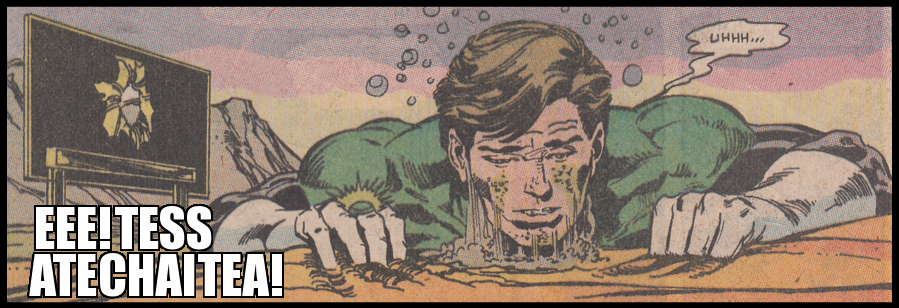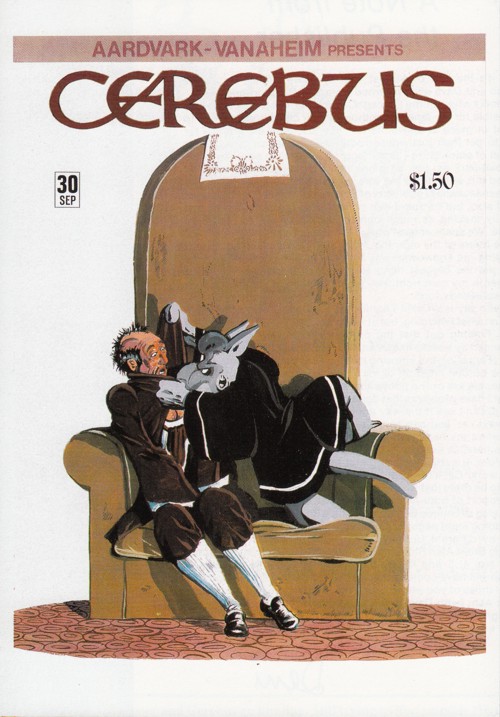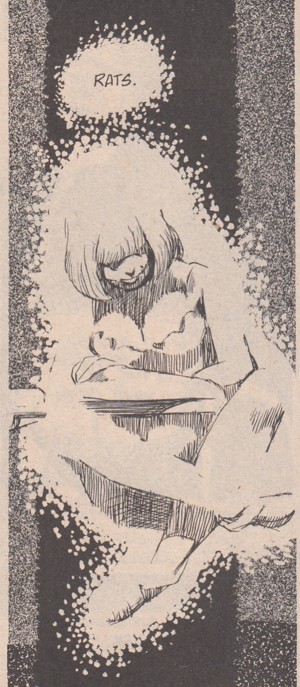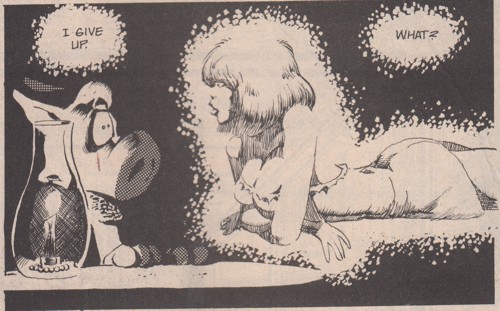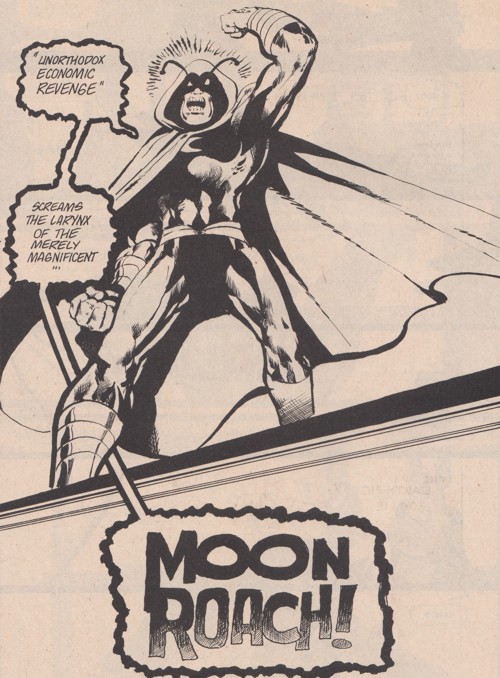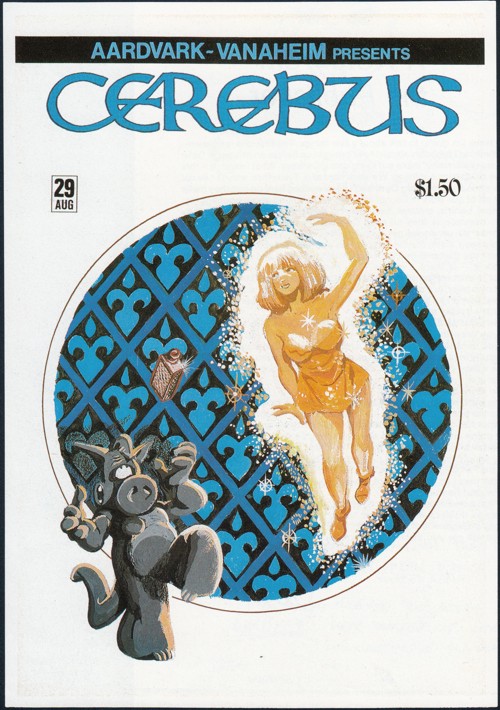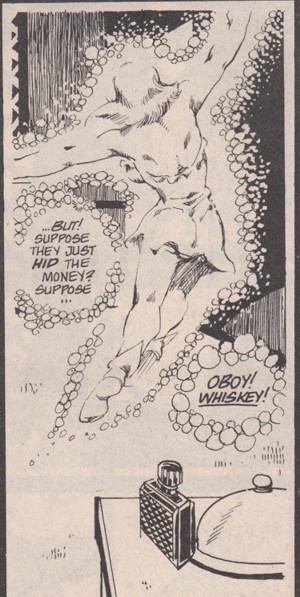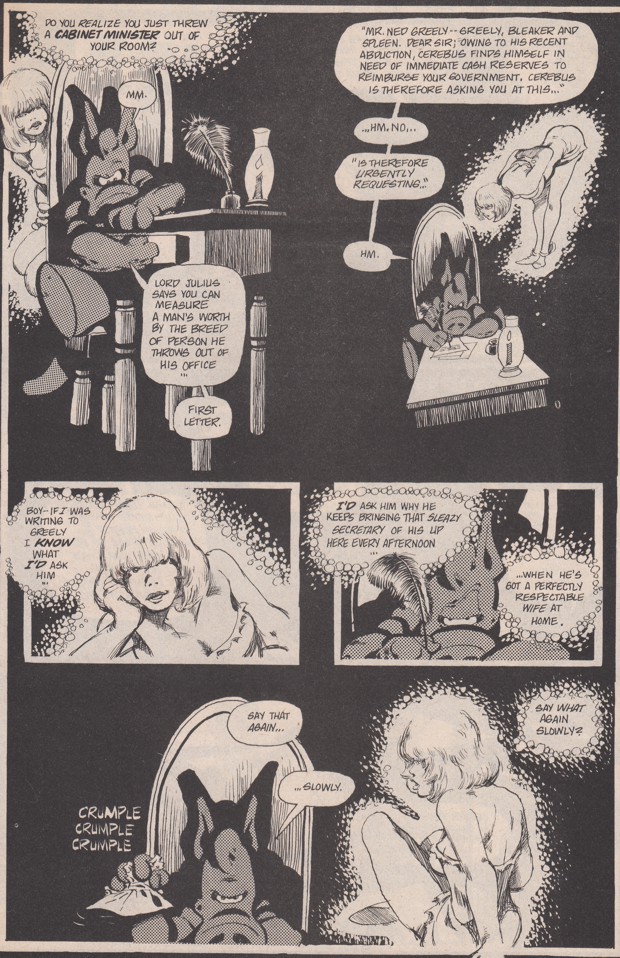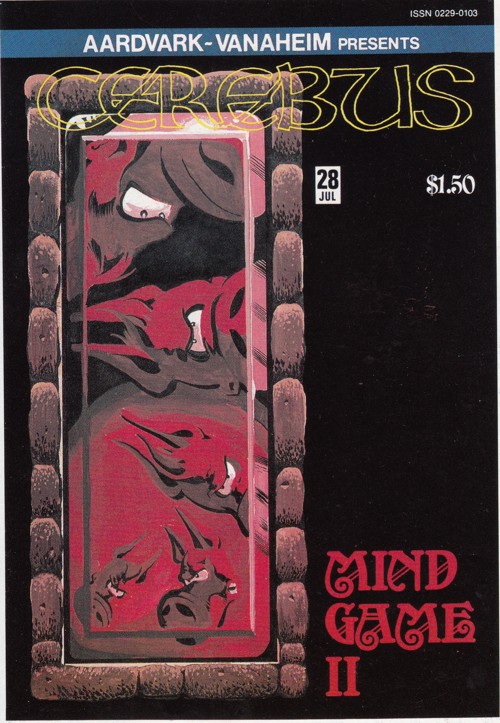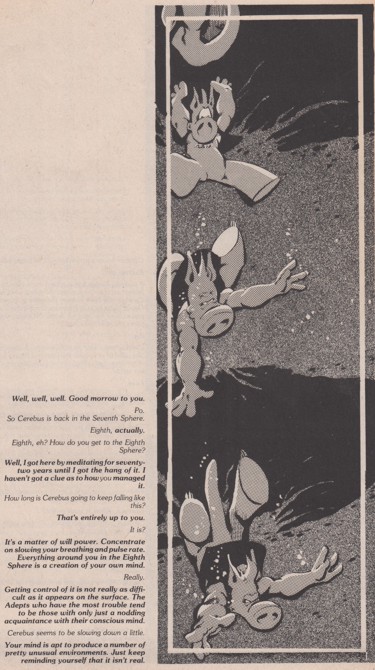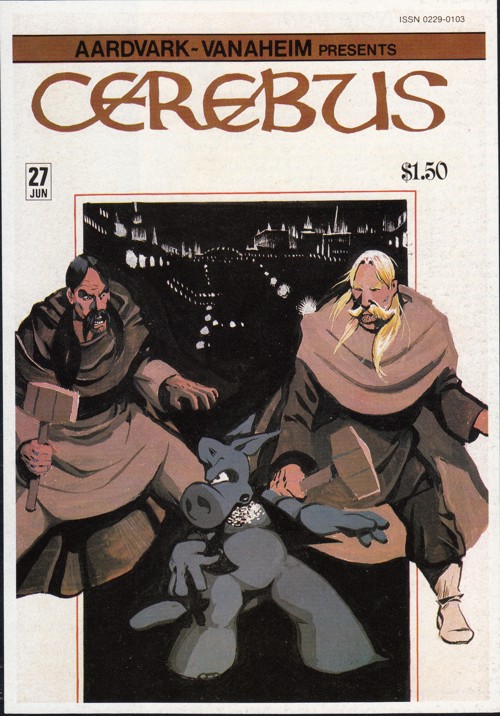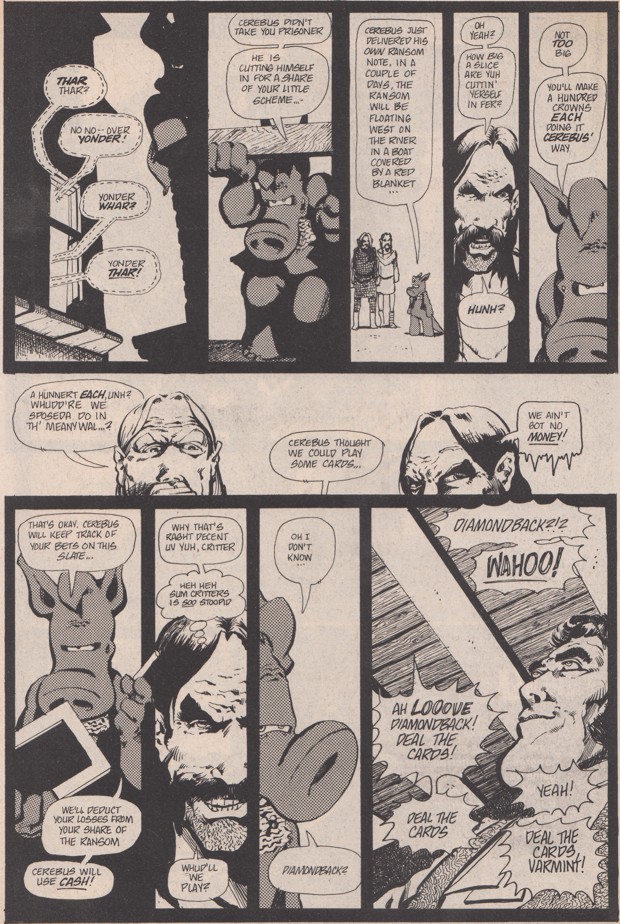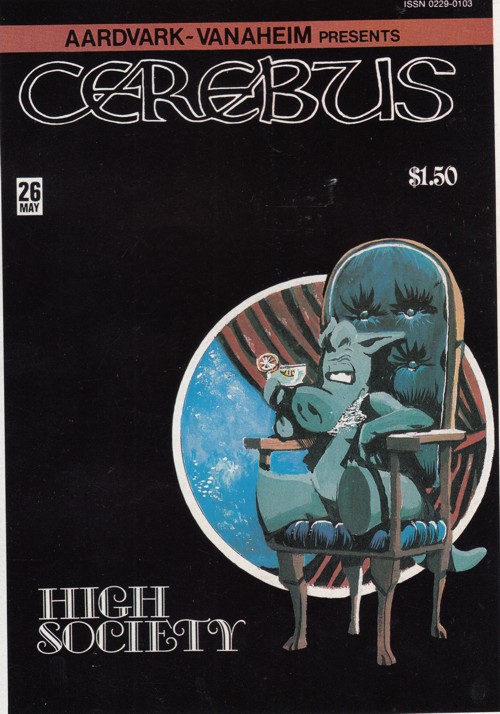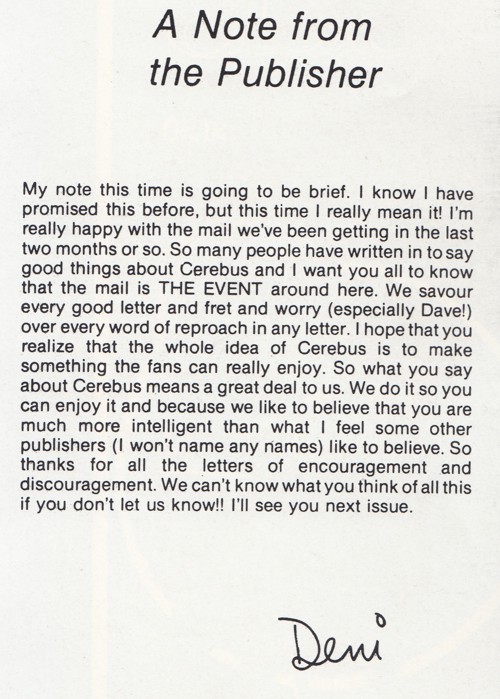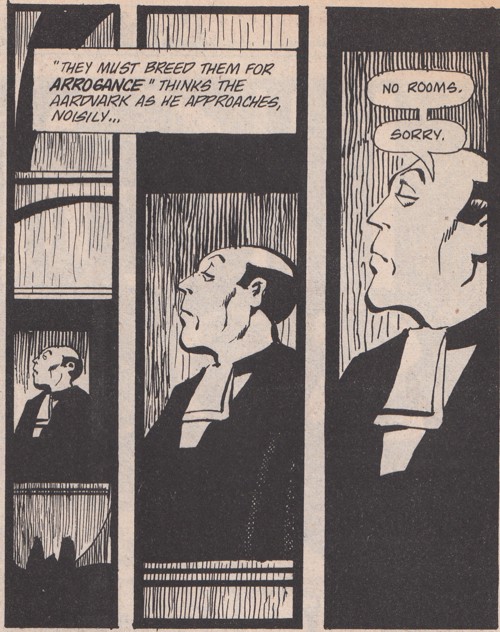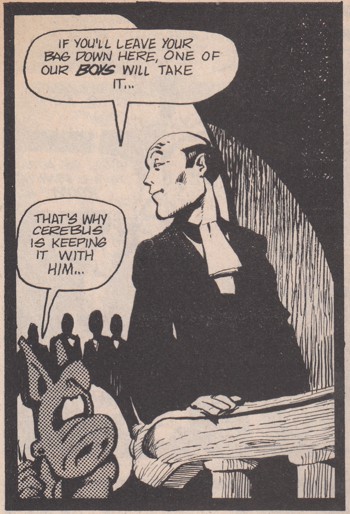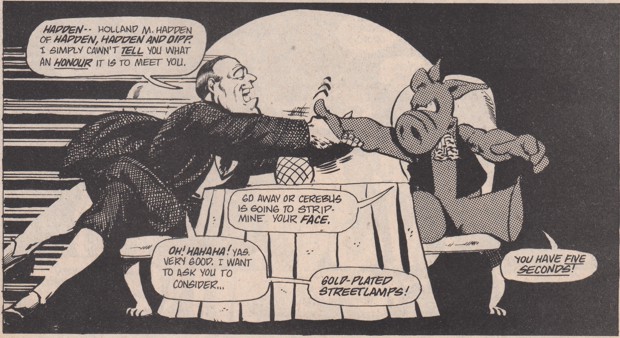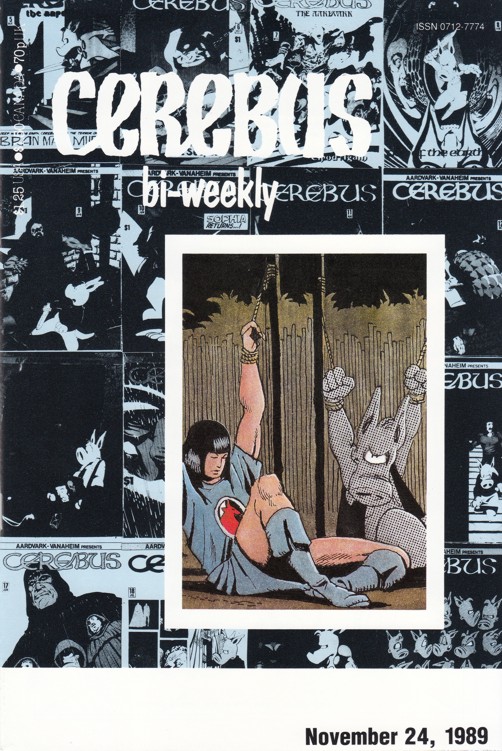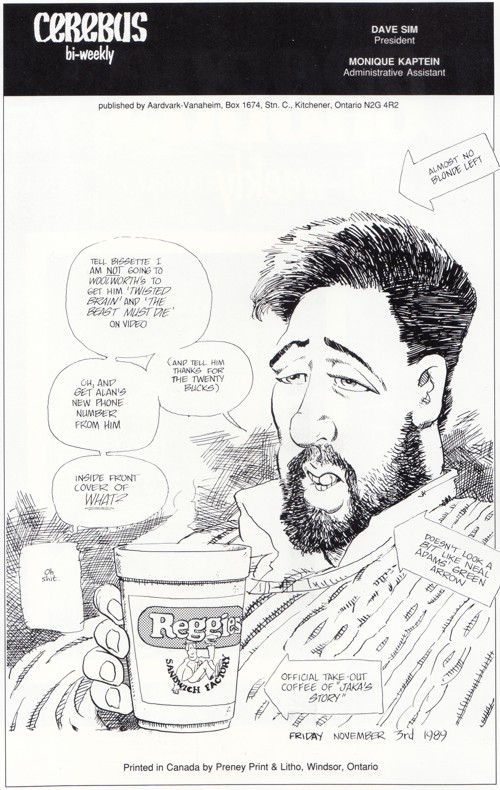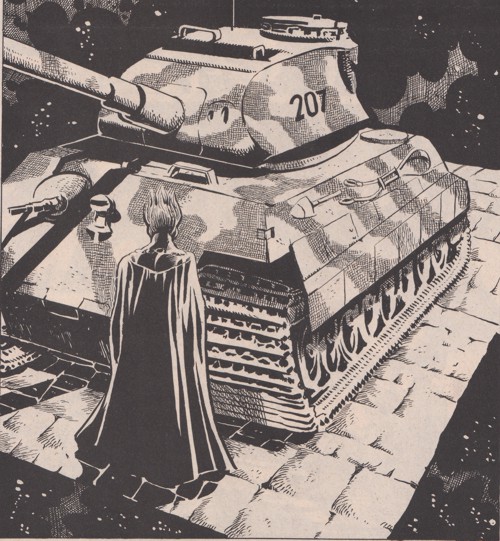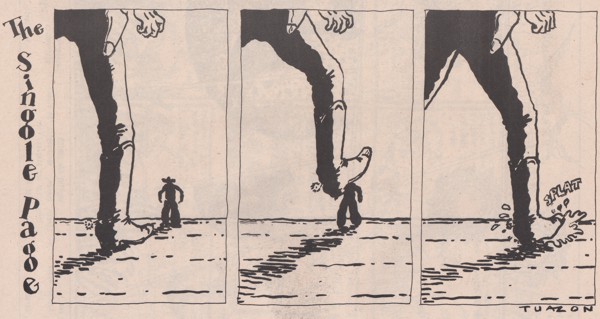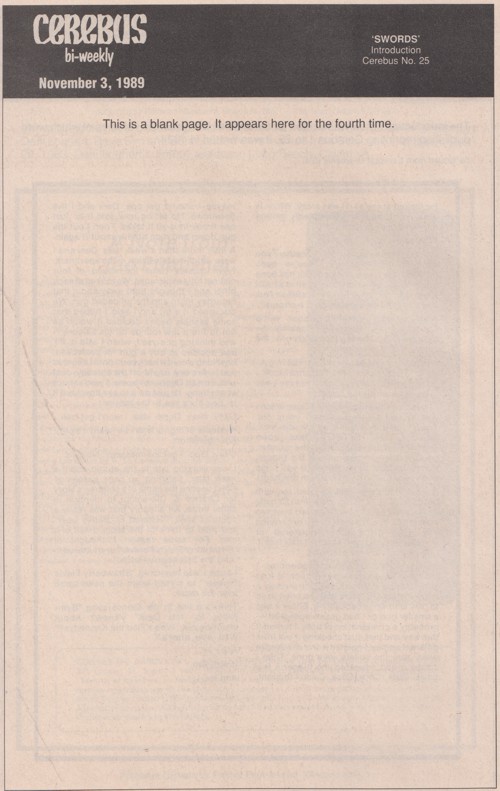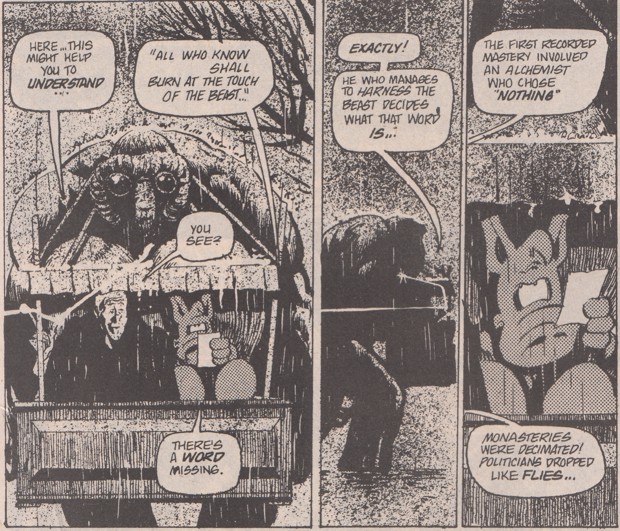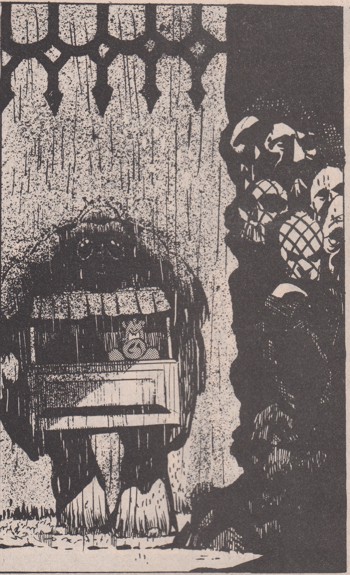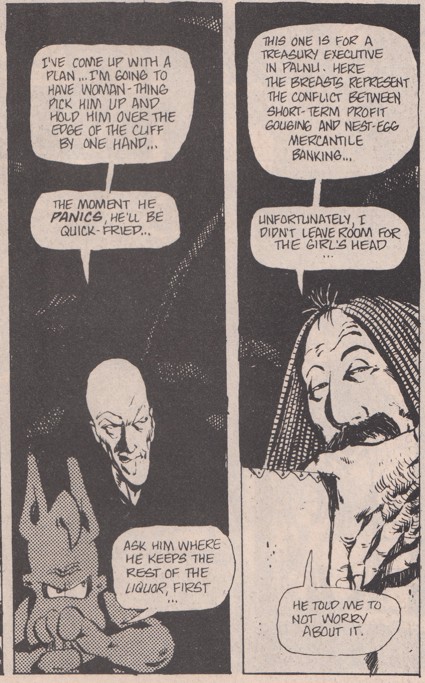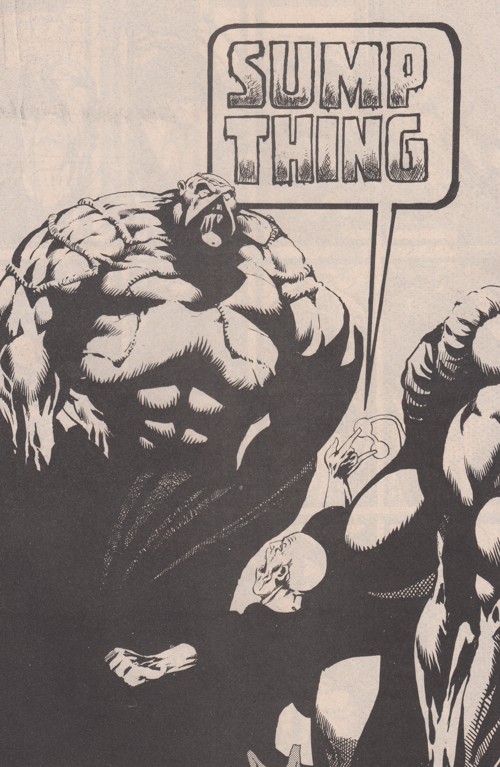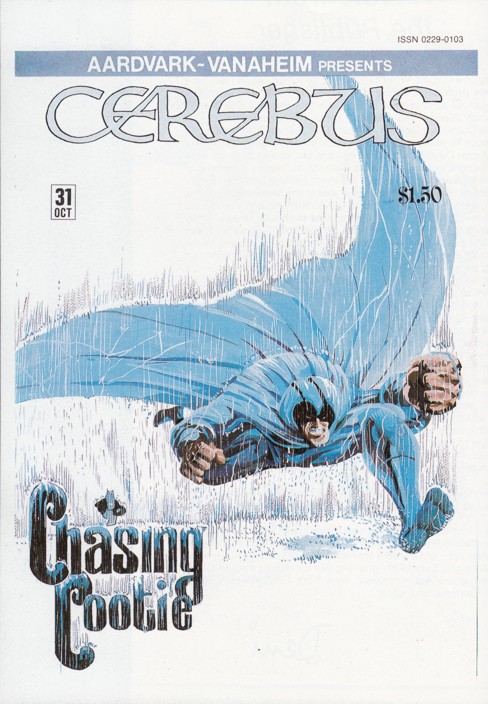
Half the artists who founded Image Comics learned to draw their "dynamic poses" from this cover.
I thought Dave Sim wasn't supposed to highlight his Marvel parody characters on the cover after the Wolveroach fiasco? I guess nobody would look at this cover and think, "Isn't that Moon Knight?" Based on the size of his body parts and ignoring my bending of the space/time continuum, I would have looked at this comic on the shelf and thought, "Isn't that Youngblood?"
Did Cockroach invent the toe shoes? Dave should have sent this cover to the U.S. patent office. Cha-ching!
This is the best "A Note from the Publisher" Deni has ever written because it lavishes praise on Wendy and Richard Pini. I had a chance to lavish praise on them when I got some books signed but I didn't because I can't speak properly to people. I also met Dave at some small publisher's expo and almost certainly said no more than two words to him. You can make up those two words. I don't want to limit how you imagine the meeting went, especially if you hate Dave Sim. But I'll give you a clue as to how my interaction with any comic professional I've ever met has gone: I wrote scathing reviews of Scott Lobdell's work online for years and was absolutely gracious to him when I had him sign something. I'm either a wimp or a very respectful young man.
I'm not young but whenever I run into old guys while working, they call me "young man" and it fills my heart with joy. Not because I'm fooled into thinking I'm young but bless them for their good-natured subjective relativity.
Sim's "Notebooks" has a bunch of sketches trying to get Astoria's look down. That's it. Loads of Astorias that don't look like Astoria!
Did Cockroach invent the toe shoes? Dave should have sent this cover to the U.S. patent office. Cha-ching!
This is the best "A Note from the Publisher" Deni has ever written because it lavishes praise on Wendy and Richard Pini. I had a chance to lavish praise on them when I got some books signed but I didn't because I can't speak properly to people. I also met Dave at some small publisher's expo and almost certainly said no more than two words to him. You can make up those two words. I don't want to limit how you imagine the meeting went, especially if you hate Dave Sim. But I'll give you a clue as to how my interaction with any comic professional I've ever met has gone: I wrote scathing reviews of Scott Lobdell's work online for years and was absolutely gracious to him when I had him sign something. I'm either a wimp or a very respectful young man.
I'm not young but whenever I run into old guys while working, they call me "young man" and it fills my heart with joy. Not because I'm fooled into thinking I'm young but bless them for their good-natured subjective relativity.
Sim's "Notebooks" has a bunch of sketches trying to get Astoria's look down. That's it. Loads of Astorias that don't look like Astoria!
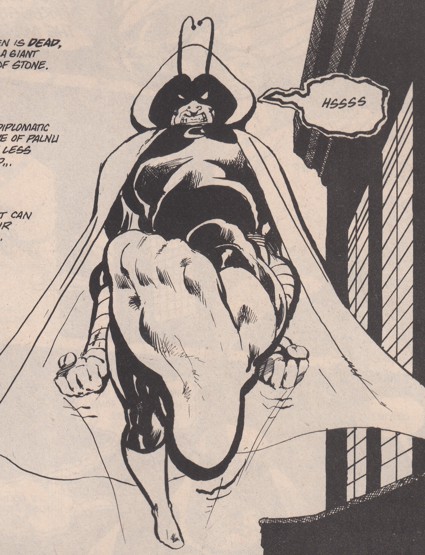
Dave Sim's Cockroach poses that are hyperbolic parodies of super hero comic books simply became the reality in the 90s. Satire and parody are always the forerunners of reality.
This issue is called "Chasing Cootie" and now I cannot be convinced by even the most rational arguments that Chasing Amy wasn't named after this comic book.
Cerebus chases Moon Roach to his lair, an apartment he shares with Astoria. Astoria's greatest gift is gaslighting people. Right now, she's pretending to love Moon Roach so she can use him in her quest for power. She lies all the time. That's probably why her name is Astoria. Because she tells storias. And not because she's based on Mary Astor like Dave says. He's just embarrassed about the "storia"/"story" word play.
Cerebus chases Moon Roach to his lair, an apartment he shares with Astoria. Astoria's greatest gift is gaslighting people. Right now, she's pretending to love Moon Roach so she can use him in her quest for power. She lies all the time. That's probably why her name is Astoria. Because she tells storias. And not because she's based on Mary Astor like Dave says. He's just embarrassed about the "storia"/"story" word play.
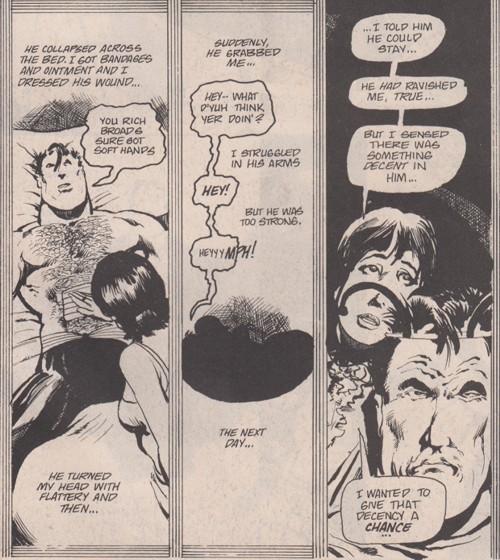
Astoria is a rapist.
I don't suppose Astoria being a rapist means getting raped by Cerebus later comes off as a fitting punishment. I think it just means Astoria and Cerebus are both rapists and terrible people.
Astoria convinces Cerebus not to have Moon Roach captured and killed for the murder of Hadden by threatening to kill herself if that happens. So instead, Cerebus just takes Moon Roach's costume so that he can never become Moon Roach again.
Astoria convinces Cerebus not to have Moon Roach captured and killed for the murder of Hadden by threatening to kill herself if that happens. So instead, Cerebus just takes Moon Roach's costume so that he can never become Moon Roach again.
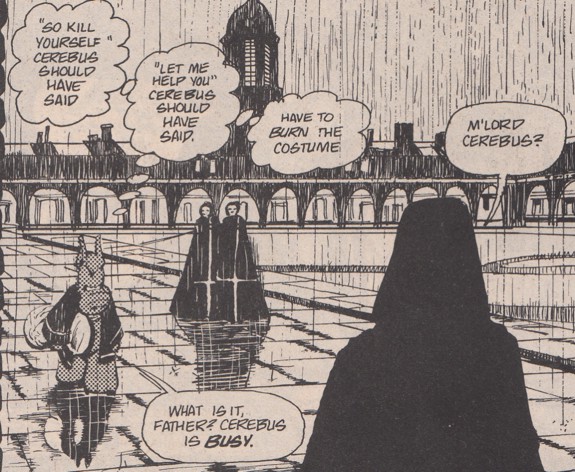
Cerebus would get himself out of a lot of trouble if he stopped giving a shit about other people.
The Moon Roach apparently had some spare costumes (a fact Astoria surely knew) because he reappears almost immediately to crush two of the Pope's Inquisitors as they question Cerebus about his role in the death of Hadden. Which means Cerebus has made some powerful enemies without even trying. The only thing he's guilty of is entering Iest as Lord Julius's Kitchen Staff Supervisor. He's sort of lost all control over his own agency at this point.
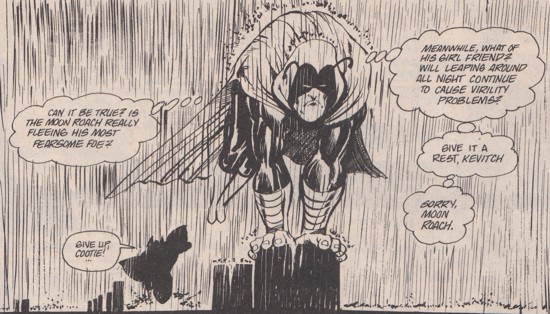
I don't know how Dave did it but he's over here parodying Image Comics in 1981!
Dave Sim is basically the grandfather of Image Comics and now I see he's the grandfather in more ways than I knew! He invented the stupid looking dynamic super hero poses that would become Image Comics' bread and butter!
Cerebus had come to Iest to relax for a bit, flush with wealth from the art dealer who owned Lord Sump's Thing. But instead, he found himself surrounded by lobbyists trying to get Lord Julius's attention, city guards trying to protect the surprise Palnu ambassador, caught up in a kidnapping plot that cost him 12,000 gold crowns, an accessory to murder because of the Moon Roach, and in the scary sights of the Church of the Living Tarim. The only person on his side is an elf that's more urban legend than reality. It's going to take more than his little sword to get him out of this mess. Does he even have his sword anymore? And whatever happened to his helmet? He's still got his necklace of medallions though because the Elf was trying them on this issue. Cerebus has a tough time holding on to his possessions.
"Aardvark Comment" was three pages long this issue. So either a ton of mail came in at once due to the Canadian Mail Strike of 1981 or we're already seeing the beginning of Dave answering loads and loads of letters every month. Fans are still complaining about not knowing what happened to Cerebus after the first "Mind Games" in issue #20 so Dave has to keep revealing more and more behind-the-scenes magic to keep these continuity nerds happy. But Dave also revealed that he's working on a story with Gene Day, "What Happened Between Issues Twenty and Twenty-two?" Yes, that's exactly how Dave typed it in the letters pages. I think I can guess what happened between those issues: Issue Twenty-one. Dave says that story will be in Swords of Cerebus Volume Three so maybe I should just find it online and read it already.
Between "Mind Games" and Cerebus waking up in Beduin, he's kidnapped by a Dr. Strange parody, a couple of Seprans, a Freak Show, some guy not long for the world, Sir Gerrick, and, finally, Astoria. Astoria we've met! Sir Gerrick I don't think we'll meet again. Maybe. But he'll definitely be discussed since he is, I believe, Cirin's son. The main takeaway is that a whole lot of people in Estarcion know aardvarks are valuable for some reason. Probably because of their weird magical aura power. They're probably better than a lucky rabbit's foot to have around. By the end of the story, Astoria takes Cerebus and dumps him in Beduin to be found by Weisshaupt. Does she do it just to get Cerebus out of Sir Gerrick's hands? Or does she do it to put a wrinkle in Weisshaupt's? Since it's Astoria, it's probably a bit of both.
Cerebus #31 Rating: B. This story shows how little control Cerebus currently has of his own life. We're also seeing the beginnings of how much control of Cerebus's life Astoria does have. Everybody wants to manipulate Cerebus's life to gain some kind of power or wealth in their own. It'll be standard procedure for some time to come, really. I'm not sure he really gains any kind of control until he dumps Jaka in Going Home! The Moon Roach and Astoria stuff is top notch but the book kind of falls apart in the last few pages where the joke is just the Regency Elf laughing at Cerebus's fuzzy dried hair while he whinges on about his life. It just feels like Dave didn't know how to end it so he decided to make the Elf do something cute while not really listening to Cerebus because she's so distracted. Although the scene is probably proof that the Elf isn't real because she never once crinkles up her cute little nose over the smell of wet Cerebus.
Cerebus had come to Iest to relax for a bit, flush with wealth from the art dealer who owned Lord Sump's Thing. But instead, he found himself surrounded by lobbyists trying to get Lord Julius's attention, city guards trying to protect the surprise Palnu ambassador, caught up in a kidnapping plot that cost him 12,000 gold crowns, an accessory to murder because of the Moon Roach, and in the scary sights of the Church of the Living Tarim. The only person on his side is an elf that's more urban legend than reality. It's going to take more than his little sword to get him out of this mess. Does he even have his sword anymore? And whatever happened to his helmet? He's still got his necklace of medallions though because the Elf was trying them on this issue. Cerebus has a tough time holding on to his possessions.
"Aardvark Comment" was three pages long this issue. So either a ton of mail came in at once due to the Canadian Mail Strike of 1981 or we're already seeing the beginning of Dave answering loads and loads of letters every month. Fans are still complaining about not knowing what happened to Cerebus after the first "Mind Games" in issue #20 so Dave has to keep revealing more and more behind-the-scenes magic to keep these continuity nerds happy. But Dave also revealed that he's working on a story with Gene Day, "What Happened Between Issues Twenty and Twenty-two?" Yes, that's exactly how Dave typed it in the letters pages. I think I can guess what happened between those issues: Issue Twenty-one. Dave says that story will be in Swords of Cerebus Volume Three so maybe I should just find it online and read it already.
Between "Mind Games" and Cerebus waking up in Beduin, he's kidnapped by a Dr. Strange parody, a couple of Seprans, a Freak Show, some guy not long for the world, Sir Gerrick, and, finally, Astoria. Astoria we've met! Sir Gerrick I don't think we'll meet again. Maybe. But he'll definitely be discussed since he is, I believe, Cirin's son. The main takeaway is that a whole lot of people in Estarcion know aardvarks are valuable for some reason. Probably because of their weird magical aura power. They're probably better than a lucky rabbit's foot to have around. By the end of the story, Astoria takes Cerebus and dumps him in Beduin to be found by Weisshaupt. Does she do it just to get Cerebus out of Sir Gerrick's hands? Or does she do it to put a wrinkle in Weisshaupt's? Since it's Astoria, it's probably a bit of both.
Cerebus #31 Rating: B. This story shows how little control Cerebus currently has of his own life. We're also seeing the beginnings of how much control of Cerebus's life Astoria does have. Everybody wants to manipulate Cerebus's life to gain some kind of power or wealth in their own. It'll be standard procedure for some time to come, really. I'm not sure he really gains any kind of control until he dumps Jaka in Going Home! The Moon Roach and Astoria stuff is top notch but the book kind of falls apart in the last few pages where the joke is just the Regency Elf laughing at Cerebus's fuzzy dried hair while he whinges on about his life. It just feels like Dave didn't know how to end it so he decided to make the Elf do something cute while not really listening to Cerebus because she's so distracted. Although the scene is probably proof that the Elf isn't real because she never once crinkles up her cute little nose over the smell of wet Cerebus.
